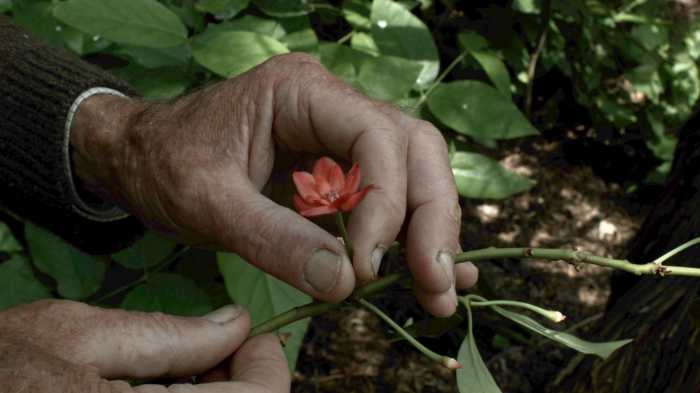Part of this year's “New Directors/New Films” series, co-presented by MoMA and the Film Society of Lincoln Center, “La France” is undoubtedly the best gender-bending World War I musical you'll ever see. Impossible to classify, it's a war movie with a love story that only flowers in its beginning and then in its closing moments. It's far more fully realized than the kind of promising but not quite accomplished film “New Directors/New Films” often showcases.
Its use of four original songs, performed by the cast, is a good example of its oddness. Without overt anachronisms, its soundtrack ties together World War I, the psychedelic counterculture 50 years later, and the present. Full of layered vocal harmonies and acoustic instrumentation, it recalls the light pop of late '60s Beach Boys and Bee Gees.
LA FRANCE
Directed by Serge Bozon
In French with English subtitles
Unifrance
Walter Reade
Apr. 4 at 8:45 p.m.
W. 65th St. btwn. Broadway & Amsterdam Ave.
Museum of Modern Art
11 W. 53rd St.
Apr. 5 at 3:15 p.m.
$11, $7 for students & seniors
Tickets for both venues
at filmlinc.com
Simultaneously, the soundtrack also suggests contemporary indie rock sounds like those of Animal Collective and Beirut who have been influenced by that period. All the same, it remains true to the World War I era, played on homemade guitars and violins made from trash and recorded live, intricate vocals and all, with no studio overdubbing.
In the opening scene of “La France,” women gaze out on a rural landscape, looking for soldiers. Camille (Sylvie Testud) feels so lonely without her husband, a soldier in the French Army's 30th Regiment, that she tracks down a platoon and finds news of him. In order to join the army, she cuts off her hair and binds her breasts, disguising herself as a 17-year-old boy. Heading into the countryside, she meets up with a regiment led by a nameless lieutenant (Pascal Greggory).
At first, the regiment is very reluctant to let her tag along. When they come to a bridge, they tell her to head to a nearby village, but she jumps off the bridge and nearly drowns. Gradually, they come to accept her presence, although suspicions about her persist.
Camille isn't exactly transgendered. She dresses as a man for a specific goal, not because she feels that she really is male. However, “La France” suggests that the chaos of wartime can break down otherwise rigid boundaries of gender and sexuality. The soundtrack plays a key role in this process. The troop of gruff, mustachioed men relax by singing love songs written from a woman's perspective. Their final three songs all begin with the line “I, a blind girl.” As sung by men, the film's first song, which describes a male lover's bedroom, is particularly homoerotic.
Cinematographer Cécile Bozon, who is the director's sister, gives “La France” an atmospheric look so vivid that when it rains, you can almost feel the humidity. Much of the film was shot at night. However, the daytime scenes are color-coordinated to a breathtaking degree. The film's palette is dominated by pale blues and greens, with military uniforms matching the tones of the surrounding forest and grass.
Not since Apichatpong Weerasethakul's “Tropical Malady” has nature seemed so uncanny or been such a strong cinematic presence. Bozon shies away from close-ups, preferring long shots taking in vast landscapes in one image.
“La France” feels dreamlike. For a war film, it's relatively light on bloodshed, making the few occurrences of violence all the more startling. At the same time, it's a realistic treatment of military life, depicting it as a long stretch of boredom and endless, exhausting wandering punctuated by bursts of carnage and unpleasantness.
Ironically, Camille, who joins the troop for purely personal reasons, turns out to be a good soldier, though her bravery may stem from an impulsive streak that the lieutenant views as suicidal. Its depiction of the army never plays like a Civil War reenactment or costume party, since the ensemble cast is remarkably convincing in their grungy uniforms and dirty faces.
Bozon's soldiers sing of the mythical land of Atlantis, celebrated by '60s singer Donovan. As we eventually find out, their destination is Holland, which seems to represent more of an ideal than a real place, a haven free from sorrow and violence. Meanwhile, Camille is on a parallel quest to re-connect with her husband.
Visually, “La France” is remarkably pretty, but it expresses a dark worldview, in which individuals may find satisfaction but the collective is doomed to have their hopes deferred endlessly. Utopia is nowhere in sight, and just going on living may be a privilege. If “La France” is a portrait of France itself, as its title suggests, it depicts a nation of dreamers caught in an endless quagmire, searching for a way out, but unable to get very far. Holland remains close, but impossible to reach.


































